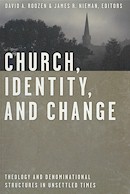|
Organizing Religious Work for the 21st Century
National Organizations
The project included a focused attention on eight existing national
"denominations," chosen because of their differences in history,
polity, theology and ethnic heritage they represented.
Eight Focus Denominations
Assemblies of God
Episcopal Church
Lutheran Church, Missouri Synod
National Baptist Convention, USA, Inc.
Reformed Church in America
United Church of Christ
United Methodist Church
Vineyard Fellowship
For each denomination, a four person team--a sociologist, a
theologian, a historian and a denomination executive [view the list of researchers]--sought to
discover and articulate how the national organization defines its
tasks, and how it structures itself to accomplish them through
interview, survey, and historical analysis. In addition, these teams
are engaging each denomination’s leaders on the theological
assumptions that are embodied in their ways of working.
Survey Instruments used at the national denominational level include:
- Key informant interviews in each of the denominations
- Questionnaire of Assemblies of God Pastors
- Association of Vineyard Churches Pastors Survey
- Historical summaries of denominations
The national level reports will soon be online.
A following book is a summary of the ORW findings:
 Church, Identity, and Change: Theology and Denominational Structures in Unsettled Times Church, Identity, and Change: Theology and Denominational Structures in Unsettled Times
David A. Roozen and James R. Nieman (editors)
view the table of contents
Book description:
Are denominations passé? In the face of theological crises and plunging membership numbers, the days of some denominations appear to be numbered. Other denominations, though holding their own, are also feeling the stresses of large-scale social change.
Church, Identity, and Change offers an unprecedented, in-depth, inside look at the church today through the lens of eight diverse Protestant denominations. For each of the denominations examined — Assemblies of God, Association of Vineyard Churches, Episcopal Church, Lutheran Church–Missouri Synod, National Baptist Convention, Reformed Church in America, United Church of Christ, and United Methodist Church — an interdisciplinary team of scholars presents a historical overview, a sociological case study, and a theological essay. These denominations represent a wide scope of American churches — liberal and conservative, old and new, declining and growing, liturgical and nonliturgical. The case studies particularly bring to life each church’s distinctive challenges, including financial scandal, the death of a founder, and more.
The book as a whole submits a timely assessment of the relationship between Christian faith and denominational structures. At a time when many analysts are heralding a major paradigm shift from modern to postmodern forms of organization, Church, Identity, and Change tracks how these several denominations are restructuring their organizational identities and practices to embody their theological commitments in a postmodern world. This book is an essential resource for those concerned about the fate of the church in the twenty-first century.
Social Conflicts Challenge the Resilience of America’s Historic Denominations, a Hartford Seminary press release highlighting this book
|
